苏教版小学五年级下册习作4
苏教版五年级语文下册 习作4 写参观记或游记(附教案)

穿过甬道,我们来到墓室。墓室共15间, 面积达700多平方米,几乎掏空了整个山体。马 厩、兵器库、厨房、歌舞厅、会客厅……一应俱 全,完全是仿造墓主人——楚王刘注生前居住的 宫殿建造的。最有趣的是刘注夫人墓室内的歌舞 厅。一根粗大的擎天矗立在大厅的中央,拱形的 屋顶上有许多凸起的小石包。抬头仰望,那屋顶 宛如浩渺的夜空,而那些小石包,就是散落在天 空中的星星。
有条理
(2)文中哪些语句介绍了作者的参观 线路?用横线划下来。
步入南面的甬道,只见一束红 色的激光从墓内直射出来。 穿过甬道,我们来到墓室。 走进北甬道,导游让我们注意 石壁下面的石槽。
过渡自然
按照作者的路线,思考:作者到底写 了哪些景物?
游览的顺序
甬道 ----墓室 ---- 马厩 ---- 兵器库 ---有重点
•
说笑间,不知不觉我们就登上了山顶。从山上向下 俯视,马路四通八达,楼房一幢接一幢,江面上传着几 艘豪华的大轮船,码头旁的大吊车犹如长颈鹿玩具,好 一片壮观景象。 狼山因为落座在一马平川、沃野千里 的江海平原之上,耸立在一望无垠的长江之滨,所以显 得特别突兀高大。尤其是它山势陡峭,拔地而起,临江 高耸,直插蓝天,气势更加非凡。登上支云塔,仿佛觉 得不是站在一座百米小山之上,而是置身于九霄云外了 。辽阔的江海平原,从脚下一直伸展到无边的远方;滚 滚的万里长江,犹如一条闪光的缎带,从遥远的天际蜿 蜒而来,奔腾入海;那海,那长江入口处的大海,更是 水天相连,烟波苍茫,好一派江天寥廓、沧海浩瀚的壮 丽景象。怪不得宋朝大诗人王安石来此,情不自禁地发 出这样的赞叹:“遨游半是江湖里,始觉今朝眼界开” 。想起萃景楼前两根石柱上的那副楹联:“长啸一声山 鸣谷应,举头四顾海阔天空”。我们的胸怀也顿觉无限 宽广!这样的山,怎能不名闻遐迩呢?
苏教版五年级下册习作4 学写参观记或游记课件(含过渡语)

• 除了可以看县城全景,楼上每个方位、每 个角度都有不一样的风景,从左边看县城 仿佛被绿荫环绕。从右边看又是一望无际 的竹林。楼下还建有一个地下室,经常有 书画摄影作品展出。 • 民族广场之旅到此结束,谁来说说我们游 览了哪些地方?
花腰傣铜像
水景观 五彩云楼
音乐喷泉
民族风情柱
• (评价:同学们真了不起!记录得真准确!)
想一想:我们游览了哪些地 方?哪个地方你最感兴趣?尝试 着把你看到的、听到的、想到的、 感受到的用例文的方法介绍给大 家。
一到民族广场我们首先看到的会是什么? (花腰傣铜像)
• 谁来为我们描述一下?象征着什么?(勤 劳的人民)听到了什么?他们在歌颂什么? (美好的生活) • 铜像的背后是什么?(音乐喷泉)
一楼为陈列室,图文并 茂地宣传新平改革开放30 年所取得的成就;顺着古朴 的楼梯旋转上楼就到了二楼, 这儿集中展示了新平的民族 文化和人文历史。三楼,可 眺望县城全景,并悬
挂一口外形古朴、制作精巧 的3吨重铜铸大钟,钟体铭 文《新平赋》,钟声响起时, 将美好的祝愿传遍千家万户, 祝福全县人民吉祥安康。
• 音乐喷泉两侧有什么呢?(12根民族风情 柱)
• 它代表着什么?(新平的12个乡镇) • 继续往南走就到了哪里?
• 水景观(出示图)指名介绍。
• 沿着水景观两旁的石阶拾级而上就来到了
• 它的名字叫“五彩云楼”,也叫“新平钟 楼”,算是县城里的一个标志性建筑了, 对新平有着非凡的纪念意义。
• 还记得游览之前老师给大家提的要求吗?
想一想:我们游览了哪些地 方?哪个地方你最感兴趣?尝试 着把你看到的、听到的、想到的、 感受到的用例文的方法介绍给大 家。
• 那你最感兴趣的是哪个地方?你能试着把 你所见、所闻、所感运用例文的方法介绍 给大家吗? • 7.指名汇报。谁来评价一下。(说的很 完整。语言生动形象还用了比喻和列数字 的方法。) • 8.如果把刚才同学们的话记录下来就是一篇 文章。拿出习作草稿本,用笔记录本次游 览中最精彩的一个片段吧。 • 9.提示书写:“提笔即是练字时”注意写字 姿势。有的同学真是下笔如有神,转眼就 写了好几行。
苏教版五年级下册语文第四单元作文范文

苏教版五年级下册语文第四单元作文范文苏教版五年级下册语文第四单元作文的主题是关于一次旅行,注意对景点及旅行中遇到的人和事的描写。
店铺在此整理了苏教版五年级下册语文第四单元作文范文,供大家参阅,希望大家在阅读过程中有所收获!苏教版五年级下册语文第四单元作文范文篇1学校放暑假的第三个星期的星期六,我们一家人带好行李自驾游向青海湖出发。
虽然我的目的地是青海湖可我们只在青海湖玩一天,我们把大部分的时间都用在自驾游的途中。
途中我们还要到红原大草原去看看红原上的牦牛和绵羊。
车开得很快不知不觉就到了一碧千里的红原大草原,那里的草、牦牛、绵羊和蓝天白云汇成了一幅美丽的画。
一片辽阔的大草原,大的无边无际,微风还挟着泥土散发的芳香,这么美的景象让我们流连忘返,但我们的目的地就在“前方”了,我们一家人在草原上留影后继续上路了。
我们的车离开了红原,走过了一个个的地方,拍了一张张的照片,终于到了目的地青海湖。
我们听当地人说我们来的时候是青海湖最美的时候,因为清海湖周围的油菜花都开了,我听了就问妈妈说:“妈妈青海湖在哪里呀?我没看见!”我的视线沿着妈妈手指的地方望去“哇……”青海湖的颜色完全和天溶为一体,前面的油菜花一衬托更显得青海湖的美了!我们的车沿着青海湖开了五分钟终于到了青海湖入口,我们买了门票走进一看眼前看见的我都不敢相信了,青海湖的颜色蓝的可以和天比美,我在走进一看,青海湖的水是那么蓝,使人感到翡翠的颜色太浅,蓝宝石的颜色又太深,纵是名师高手,也难以描摹。
一天很快过去了,我现在开始怪罪时间过得太快,我们的车已开到了回家的路上。
苏教版五年级下册语文第四单元作文范文篇2那一次,坝上草原、闪电湖、密云水库出现在我面前。
那一次,黑龙潭、白龙潭、黄龙潭又呈现在我面前......这一次我终于来到了黄山脚下。
黄山位于安徽省南部,北与佛教名山“九华山”相连,南与山清水秀的屯溪及道教圣地齐云山为邻。
它东西约长40公里,南北约长30公里,总面积为1200平方公里,核心景区月154公里。
苏教版五年级下册语文第四单元作文:参观科技馆
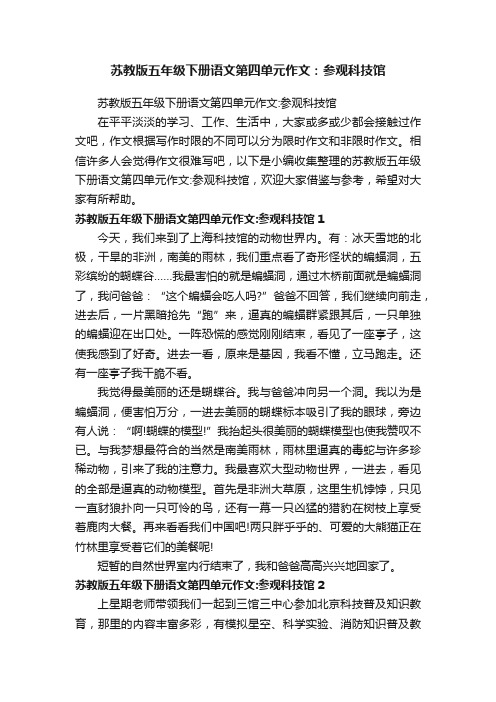
苏教版五年级下册语文第四单元作文:参观科技馆苏教版五年级下册语文第四单元作文:参观科技馆在平平淡淡的学习、工作、生活中,大家或多或少都会接触过作文吧,作文根据写作时限的不同可以分为限时作文和非限时作文。
相信许多人会觉得作文很难写吧,以下是小编收集整理的苏教版五年级下册语文第四单元作文:参观科技馆,欢迎大家借鉴与参考,希望对大家有所帮助。
苏教版五年级下册语文第四单元作文:参观科技馆1今天,我们来到了上海科技馆的动物世界内。
有:冰天雪地的北极,干旱的非洲,南美的雨林,我们重点看了奇形怪状的蝙蝠洞,五彩缤纷的蝴蝶谷……我最害怕的就是蝙蝠洞,通过木桥前面就是蝙蝠洞了,我问爸爸:“这个蝙蝠会吃人吗?”爸爸不回答,我们继续向前走,进去后,一片黑暗抢先“跑”来,逼真的蝙蝠群紧跟其后,一只单独的蝙蝠迎在出口处。
一阵恐慌的感觉刚刚结束,看见了一座亭子,这使我感到了好奇。
进去一看,原来是基因,我看不懂,立马跑走。
还有一座亭子我干脆不看。
我觉得最美丽的还是蝴蝶谷。
我与爸爸冲向另一个洞。
我以为是蝙蝠洞,便害怕万分,一进去美丽的蝴蝶标本吸引了我的眼球,旁边有人说:“啊!蝴蝶的模型!”我抬起头很美丽的蝴蝶模型也使我赞叹不已。
与我梦想最符合的当然是南美雨林,雨林里逼真的毒蛇与许多珍稀动物,引来了我的注意力。
我最喜欢大型动物世界,一进去,看见的全部是逼真的动物模型。
首先是非洲大草原,这里生机饽饽,只见一直豺狼扑向一只可怜的鸟,还有一幕一只凶猛的猎豹在树枝上享受着鹿肉大餐。
再来看看我们中国吧!两只胖乎乎的、可爱的大熊猫正在竹林里享受着它们的美餐呢!短暂的自然世界室内行结束了,我和爸爸高高兴兴地回家了。
苏教版五年级下册语文第四单元作文:参观科技馆2上星期老师带领我们一起到三馆三中心参加北京科技普及知识教育,那里的内容丰富多彩,有模拟星空、科学实验、消防知识普及教育等许多内容。
刚进入展厅,我就被那些奇妙的东西深深地吸引了。
“声波看得见”实验最有趣,就是转动下面的圆盘,同时拨动上面的钢丝,不仅能发出美妙的声音,还能看到平时无影无踪的声波,真是太神奇太好玩了!紧接着我们做了第二个有趣的实验“传声筒”,就是我在一边说话另一边的同学通过中间许多弯弯曲曲的管子可以很清晰的听到我的声音。
苏教版五年级语文习作4
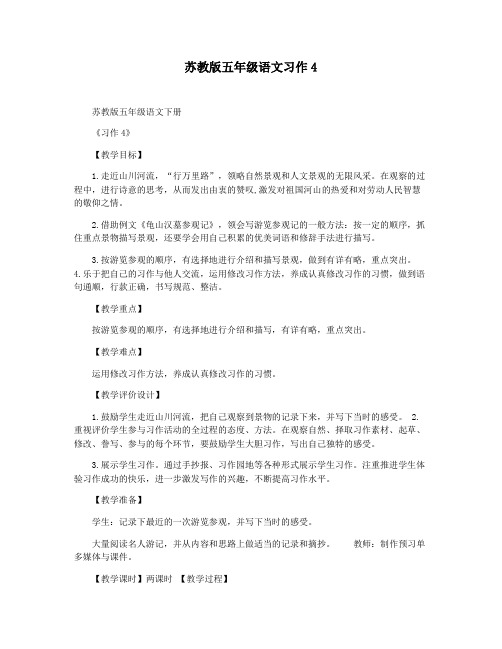
苏教版五年级语文习作4苏教版五年级语文下册《习作4》【教学目标】1.走近山川河流,“行万里路”,领略自然景观和人文景观的无限风采。
在观察的过程中,进行诗意的思考,从而发出由衷的赞叹,激发对祖国河山的热爱和对劳动人民智慧的敬仰之情。
2.借助例文《龟山汉墓参观记》,领会写游览参观记的一般方法:按一定的顺序,抓住重点景物描写景观,还要学会用自己积累的优美词语和修辞手法进行描写。
3.按游览参观的顺序,有选择地进行介绍和描写景观,做到有详有略,重点突出。
4.乐于把自己的习作与他人交流,运用修改习作方法,养成认真修改习作的习惯,做到语句通顺,行款正确,书写规范、整洁。
【教学重点】按游览参观的顺序,有选择地进行介绍和描写,有详有略,重点突出。
【教学难点】运用修改习作方法,养成认真修改习作的习惯。
【教学评价设计】1.鼓励学生走近山川河流,把自己观察到景物的记录下来,并写下当时的感受。
2.重视评价学生参与习作活动的全过程的态度、方法。
在观察自然、择取习作素材、起草、修改、誊写、参与的每个环节,要鼓励学生大胆习作,写出自己独特的感受。
3.展示学生习作。
通过手抄报、习作园地等各种形式展示学生习作。
注重推进学生体验习作成功的快乐,进一步激发写作的兴趣,不断提高习作水平。
【教学准备】学生:记录下最近的一次游览参观,并写下当时的感受。
大量阅读名人游记,并从内容和思路上做适当的记录和摘抄。
教师:制作预习单多媒体与课件。
【教学课时】两课时【教学过程】第一课时环节一、作前指导――观察体验,激活愿望一、单元引路,激发兴趣。
(一)单元例文引入。
1.单元引入。
导语:同学们,这一单元,我们参观了“世界八大奇迹”之一的秦兵马俑,游览了“沙漠之都”开罗近郊的金字塔,领略了音乐之都维也纳的风采,这一趟下来真是让我们大开眼界。
我们祖国山河秀丽,建设日新月异,有着无数的美景等着我们去观赏,去描绘。
让我们准备一份好心情,去尽情地赏玩、尽情地书写华美的篇章吧! 2.回忆这几篇课文,你觉得作者用了哪些方法写景物特点的?学生回顾课文内容,交流写法。
苏教版五年级下册习作4“学写游记”

思考下列问题: 1。文章是围绕哪句话展开描写的? 号称“中华一绝”的龟山汉墓,就 开凿在这只“大乌龟”肚子里。 2。读了文章,你感觉到了“绝”吗? 为什么?
思考下列问题: 1。文章是围绕哪句话展开描写的? 号称“中华一绝”的龟山汉墓,就 开凿在这只“大乌龟”肚子里。 2。读了文章,你感觉到了“绝”吗? 为什么? 3。小作者重点写了哪些部分?文章 是怎样抓住一个“绝”字来介绍和 描写的呢?
练习写作:
你参观、游览过 哪些地方?请学习例文 的写法,写一篇参观记 或游记,题目自定。
我们又到了“科学原理区”。这一片区 的作品都是根据科学原理研制成的。那毫不 起眼的“魔球”很有趣,“魔球”与平常的 皮球一般大小,中间有一个蓝色的球,周边 有七八根紫色的小绳。 我们又去了“标本展览”处参观,这儿 到处都是五光十色的贝壳标本和五颜六色的 蝴蝶标本,其中最吸引我的有可爱的鸟类标 本。这些鸟类标本栩栩如生,吸引了很多的 人。 这次参观科普馆,我的收获还真不少啊!
1、参观龟山汉墓后作者最深的感 受是什么,在文中找到一个字概 括
1、参观龟山汉墓后作者最深的感 受是什么,在文中找到一个字概 括
根据感受 确定中心
2、作者参观时先后看到什么?重 点写了什么?为什么重点写这些 景物。
2、作者参观时先后看到什么?重 点写了什么?为什么重点写这些 景物。
围绕中心 选择材料
游览的顺序
甬道 ----墓室 ---- 马厩 ---- 兵器库 ---重点
厨房 ---- 歌舞厅---- 会客厅----排水沟
感受适度 我们听了连声赞叹,真想象不 出两千多年前,我们的先人使用什 么办法开凿的。 龟山汉墓是我们先人用錾子蘸着 汗水写出来的一本书哇!我们又一 次赞叹不已。
江苏五年级下册第四单元作文他了范文
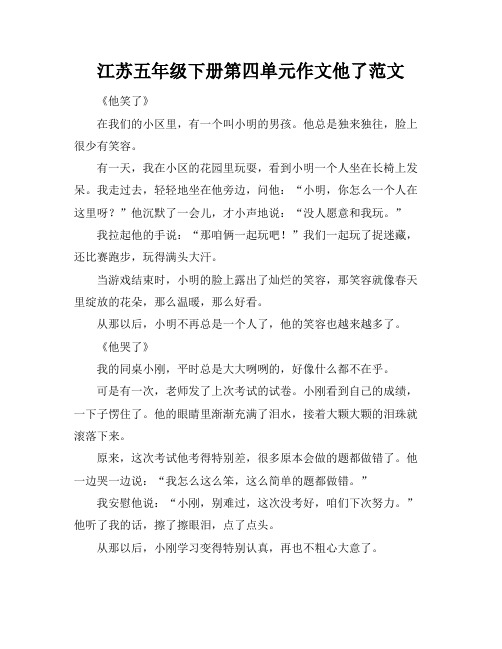
江苏五年级下册第四单元作文他了范文
《他笑了》
在我们的小区里,有一个叫小明的男孩。
他总是独来独往,脸上很少有笑容。
有一天,我在小区的花园里玩耍,看到小明一个人坐在长椅上发呆。
我走过去,轻轻地坐在他旁边,问他:“小明,你怎么一个人在这里呀?”他沉默了一会儿,才小声地说:“没人愿意和我玩。
”
我拉起他的手说:“那咱俩一起玩吧!”我们一起玩了捉迷藏,还比赛跑步,玩得满头大汗。
当游戏结束时,小明的脸上露出了灿烂的笑容,那笑容就像春天里绽放的花朵,那么温暖,那么好看。
从那以后,小明不再总是一个人了,他的笑容也越来越多了。
《他哭了》
我的同桌小刚,平时总是大大咧咧的,好像什么都不在乎。
可是有一次,老师发了上次考试的试卷。
小刚看到自己的成绩,一下子愣住了。
他的眼睛里渐渐充满了泪水,接着大颗大颗的泪珠就滚落下来。
原来,这次考试他考得特别差,很多原本会做的题都做错了。
他一边哭一边说:“我怎么这么笨,这么简单的题都做错。
”
我安慰他说:“小刚,别难过,这次没考好,咱们下次努力。
”他听了我的话,擦了擦眼泪,点了点头。
从那以后,小刚学习变得特别认真,再也不粗心大意了。
苏教版五年级下册习作4参观游记(范文43篇)

1 游览乐山大佛乐山大佛是我们到四川游览的第一个景点。
说真的,前几年修复乐山大佛时的电视我至今还记忆犹新。
也就从那时起,我便对乐山大佛产生一种向往。
没办法,我就是遗传了老妈的一点“迷信思想”,对佛非常虔诚与喜爱。
因此对这次游览,感到非常期待。
我一直以为乐山只有一个大佛,没有其它景点,因此很纳闷为什么入口建在与大佛相隔半坐山的地方。
为了赶紧看到大佛,我全速往前冲。
哎,好奇怪的岩石,怎么这么像人,头身分明,后面有一个光圈,双手合十,像是祷告些什么。
我不由地将手伸去想要摸一摸,导游制止了我,并告诉我这些是佛像,守护着乐山大佛。
只是长年的风化作用,使它们变成了这副模样。
果然,再往前走,一路都是这种佛像。
可有些佛像被侵蚀地很厉害,有些已经不成样子了。
为什么呢?我也不知道。
很快,经过了青龙潭和白虎潭,我们来到了乐山大佛的有关资料所在地。
它告诉我们一些乐山大佛显灵的事情。
其中佛光是可以用科学角度来讲解的。
可是佛像在人类的灾苦之年闭眼睛一事却没有正确的答复。
虽说是可能被风化的,可是为什么其它更容易风化的地方没有风化,偏偏只风化了眼睛呢?这仍然是个迷。
过了博物馆,往前走去,呀!好大一颗脑袋啊!我终于看到大佛了。
耳朵垂到了下巴,头上发冀数不清,鼻子挺直,嘴巴微笑着,只是这凿开的眼睛,呈八字型,好象带着一种悲伤。
再往下走佛像就多了,大佛周围嘛!拉着扶手走过了陡峭的山路,啊!完整的大佛终于出现在我的眼前。
它两手放在膝盖上,坐在山中,眼睛向外看去,守望着居民。
它可大了,就拿我面前那双脚吧,仅一片小拇指,就可以放上一张正规的方桌,旁边再做四个人也很宽阔。
前面的那个鼎太高了,香我插不上去,只得在大佛的前边插香,祷告全家平平安安。
它四周的山上步满了大大小小的佛像,可真谓是“佛是一座山,山是一尊佛”。
2 九寨沟之水在一个假期里,我们去九寨沟旅游,我高兴极了。
第二天我们到达了九寨沟风景区,进了大门,乘上绿色环保大巴,听车上导游讲,九寨沟是由九个藏族村寨组成,沟内有大量的生态资源和水产资源。
苏教版五年级下册语文习作四

苏教版五年级下册语文习作四苏教版五年级下册语文习作四篇1五岳之尊——泰山一直是我向往的一个梦想。
今年十月一放长假,终于实现了我的梦想,让我领略到了泰山的奇特与壮观。
半夜12点,叔叔开车去泰山,汽车内了高速我和哥哥就睡着了。
一觉醒来我们就来到了泰山脚下,我们准备好吃的东西准备出发喽。
因为是凌晨三点,天还不亮,黑乎乎的什么也看不见,只好买了一个手电照亮。
开始爬山了,我和哥哥像一只精神十足的小老虎一路小跑,把妈妈和阿姨拉得远远地。
一会儿就觉得有点热了,我脱下了外套,嗯轻松多了、泰山的石阶两旁有特别多卖纪念品和泰山特产的,有我们最喜爱吃的泰安煎饼,我们坐下来边吃煎饼边歇着,还喝到了泰山的山泉水,山泉水有点甜,特别好喝,我们休息了一会接着往山上爬。
爬呀爬呀,不知不觉的天差不多亮了,这时我才看见了泰山的真面目,哇!山上好美呀、我看见连绵起伏的山峰,满山都是树,郁郁葱葱的树木和五颜六色的花草。
一棵棵的迎客松像一把把大伞,好像在迎接的到来的游客。
这美丽的景色就像是一幅迷人的画卷、一阵风凉吹来,它们摇摇摆摆,好像在说,加油爬吧您一定能爬的山顶的。
我们又爬了特别长时间,我的腿来开始打哆嗦了,我问妈妈啥时候能爬到山顶呀。
妈妈说:咱们快到中天门了,能够坐索道去玉皇顶了,坚持一会儿。
听了妈妈的话,我一鼓作气又开始爬,有个下山的叔叔说前面不远就是中天门了,我兴奋极了,赶紧往上爬吧。
一会又把妈妈他们甩在了后面,哥哥没跟上来,看来他也累坏了,爬不动了。
终于坐上了索道,哇,好刺激呀、坐在索道里,生怕自己掉下去,紧紧得抓住扶手。
往山下看,下面的景色太美了,爬山的人就像五颜六色的气球在慢慢地移动。
我们从南天门下车接着往山上爬,我们还没吃早餐呢,我肚子咕咕叫,哥哥喊着饿死了。
我们找了个小吃店坐下来,煎饼山下五元一个,到了山顶涨到十元一个,方便面二十元一碗,太贵了吧、妈妈说贵也得吃,吃饱了还得接着玩呢。
我们终于爬到到了玉皇顶,站在山顶上,风呼呼地吹在我的脸上,好冷啊。
苏教版五年级下册英语第四课的作文
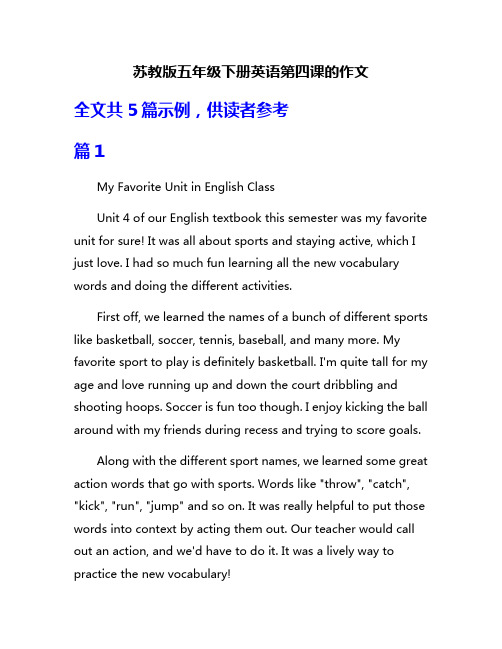
苏教版五年级下册英语第四课的作文全文共5篇示例,供读者参考篇1My Favorite Unit in English ClassUnit 4 of our English textbook this semester was my favorite unit for sure! It was all about sports and staying active, which I just love. I had so much fun learning all the new vocabulary words and doing the different activities.First off, we learned the names of a bunch of different sports like basketball, soccer, tennis, baseball, and many more. My favorite sport to play is definitely basketball. I'm quite tall for my age and love running up and down the court dribbling and shooting hoops. Soccer is fun too though. I enjoy kicking the ball around with my friends during recess and trying to score goals.Along with the different sport names, we learned some great action words that go with sports. Words like "throw", "catch", "kick", "run", "jump" and so on. It was really helpful to put those words into context by acting them out. Our teacher would call out an action, and we'd have to do it. It was a lively way to practice the new vocabulary!We also learned the names of different pieces of equipment used in sports, like "racket", "bat", "ball", "net", and so on. I have a tennis racket at home that I like to use to hit a ball against the wall and practice my swing. Someday I'll be good enough to play on a real tennis court!In addition to vocabulary, we learned how to express our interests, abilities, likes and dislikes relating to sports. We practiced asking each other questions like "What sports do you like to play?" or "Are you good at baseball?" It helped me learn how to share my own thoughts and understand my classmates' interests too.My favorite activity from the unit was when we had to make posters showcasing a sport we enjoyed. I made mine about basketball, showing pictures of a basketball court, a player dribbling, and aball going through a net. I wrote descriptive sentences underneath each picture using the vocabulary we had learned. It was a fun way to be creative while practicing our English skills.Another great activity was when we did role plays about joining a sports team or club. We had to pretend to interview each other about our skills and interests. I played the role of the coach, asking my classmate questions to see if she should beadmitted to the tennis club. It helped me practice using the vocabulary in a conversational way.Overall, Unit 4 was jam-packed with engaging activities, helpful visuals in the textbook, fun games, and opportunities to practice speaking, writing, listening and reading. All the content about different sports, actions, and equipment really sparked my interest and motivation. It felt interactive and lively compared to some of the other units.What I appreciated most though was that this unit enabled me to share my passion for sports and physical activities. At my age, I have so much energy to burn and I love being active, running around, and playing recreational games. This unit let me channel that enthusiasm while building my English skills at the same time. I got to learn how to express myself and describe my interests, goals, and experiences related to sports and fitness.I also realized through this unit how universal sports are. Even though we may speak different languages, kids all around the world still play Basketball, soccer, tennis and other games. We user similar equipment and actions. Sports can connect cultures and allow youth to find common ground. No matter our backgrounds, we all understand the joy and benefits of being physically active.In Chinese class, we focus more on academics like reading, writing, math, science and so on. Those subjects are crucial too, but English class is a space where we can explore different topics that engage our interests and personalities. Units like this one about sports make the English learning process more fun, relatable and memorable.My teacher also used this unit to teachsome broader life lessons beyond just vocabulary. She reminded us about the importance of being active and getting exercise, which is good for our growing bodies and minds. She encouraged us to join sports teams or clubs, as they build teamwork, discipline and social skills. Those are abilities that will help us be successful in any path we choose later in life.So in conclusion, Unit 4 on sports was definitely a home run (see what I did there with the baseball pun?). Between the interesting content, engaging activities, chances to be creative and collaborative, andoverarching lifestyle lessons - I came out of it with a whole new appreciation for how sports can enrich our lives and our English skills simultaneously. I wait in excitement to see what future units have in store, but Unit 4 certainly set the bar high! Maybe our next unit will be about music or art and allow us to explore those worlds just as vividly.Either way, I know my English abilities are rapidly improving thanks to our wonderful textbook and teacher. Who knows, maybe someday I'll be the next Yao Ming representing China in the NBA, smooth talking in perfect English. For now, I'm just happy to be an energetic kid student having fun withmy friends while becoming proficient in this important global language. Three cheers for Unit 4!篇2My Favorite Unit From English Class This YearHi everyone! I'm so excited to tell you all about my favorite unit we did in English class this year. It was Unit 4 from our textbook and I just loved everything we learned and did while studying it. Let me tell you all about it!The unit was called "A Diary of an Adopted Stray Dog" and it was all about this super cute stray dog named Lucky who gets adopted by a nice family. Lucky tells the whole story through diary entries which I thought was a really fun way to learn. Each diary entry talked about something new that happened as Lucky settled into his new home and life with his adopted family.In the first entry, Lucky talks about getting rescued from the streets by an animal shelter worker. He was just a tiny puppy allalone without a mom or anyone to take care of him. Lucky says he was really scared at first in the shelter, but then the worker gave him food and water and told him not to worry. I felt so bad for poor Lucky being so little and lonely like that! But I was glad he was safe at the shelter and not out on the dangerous streets anymore.Then in the next few entries, Lucky writes all about getting adopted by the Wilson family - a mom, a dad, and two kids named Amy and Michael. When the Wilsons first took Lucky home, he was really confused and missed the animal shelter at first. Everything was so new and different! But soon Lucky started to feel more comfortable as the family showed him so much love and gave him toys, a cozy dog bed, and lots of yummy food and treats.My favorite diary was the one where Lucky talks about playing fetch with Michael outside and how Michael patted him on the head and said "Good boy, Lucky!" Aw, I just loved picturing that scene in my mind of Michael throwing a ball for Lucky and Lucky bringing it back to him, both of them having so much fun together. It made me want a dog so bad! I'll have to beg my parents for one.As the unit goes on, Lucky keeps writing about all his adventures and the Wilson family continues teaching him commands like "sit", "stay", and "come". They also took him to get his puppy shots at the vet which Lucky did NOT like at all! He says those shots really hurt. I don't blame him - I hate getting shots too. They're the worst!Towards the end, Lucky's diary shows that he has become such a huge part of the Wilson family. The kids love playing with him every day after school, the mom cuddles with him on the couch while reading, and the dad even takes him on runs. In the very last entry, Lucky writes "I am one lucky dog!" and says he's so happy the Wilsons adopted him and gave him a warm, loving forever home. Aw, that part always makes me a little teary-eyed!There are so many reasons why this was my favorite unit. First of all, I'm just a huge animal lover, especially when it comes to dogs. They're literally the cutest, most loyal, happy pets ever in my opinion. Hearing all about Lucky's journey from a scared homeless puppy to a beloved family dog with a safe home was so heartwarming. It reminded me of watching those animal rescue TV shows my mom likes - you know, where they save dogs and cats from bad situations and then get them adopted. Those shows always make me cry happy tears!Another reason I adored this unit is because I'm obsessed with any books, movies, or stories told in diary/journal form. I think keeping a diary myself would be so fun to write about my daily life and all my thoughts and feelings. Getting to read Lucky's diary entries made it feel like he was a real dog writing to me and I was getting this inside look into his doggy mind. It was awesome!Plus, the unit taught us so much great vocabulary about dogs, pets, animal shelters, and taking care of an animal. Words like "stray", "adopt", "leash", "treats", "commands"...I didn't know most of those before this unit but now I'll never forget them. We also learned some super helpful sentences about describing how dogs look and act, like "The puppy is playful" or "My dog's fur is shaggy." Useful stuff to know as a future dog owner for sure!Finally, I have to mention how much I loved all the activities and projects we got to do throughout this unit. We made super cute doggy drawings and posters. We did fun role plays where we pretended to be the篇3Sure, here's an essay in English from the perspective of a fifth-grade student on Unit 4 of the Jiangsu Edition English textbook for fifth grade, around 2000 words long:My Summer Vacation in the CountrysideWow, where do I even begin? This summer vacation was one of the most exciting and memorable times of my life! I got to experience something totally different from my usual city life in Nanjing. My parents decided to take me to my grandparents' village in the countryside for a few weeks. At first, I wasn't too thrilled about the idea. I thought it would be boring, dirty, and have nothing fun to do. Boy, was I wrong!The journey there itself was an adventure. We took ahigh-speed train from Nanjing to a small town nearby the village. From there, we had to take an old bus that looked like it was from the last century! The roads were so bumpy, and the bus kept making these funny noises. I kept giggling to myself, imagining the bus breaking down in the middle of nowhere. Luckily, we made it to the village safely, albeit a bit shaken from the ride.As soon as we stepped off the bus, I was hit with the most amazing scents I've ever smelled. The fresh air, the blooming flowers, the earthy aroma of the soil – it was like nothing I hadever experienced in the city. My grandparents were waiting for us with the biggest smiles on their faces. They looked so happy to see us, and I couldn't help but feel excited too.Their house was nothing like our apartment in Nanjing. It was a traditional one-story building with a tiled roof and a courtyard in the middle. My grandparents showed us around, and I was in awe of how simple yet cozy everything was. They even had a small vegetable garden in the backyard where they grew their own food!The first few days were all about getting used to the countryside lifestyle. I had to wake up early, which was a struggle for a city kid like me. But the mornings were so peaceful and beautiful, with the sound of roosters crowing and the sun peeking through the trees. My grandparents taught me how to feed the chickens and collect the eggs. It was a bit scary at first, but I got the hang of it quickly.One of the highlights of my trip was going to the nearby river with my grandfather. He took me fishing, something I had only seen in movies or on TV. We sat by the river bank, our fishing rods in hand, waiting patiently for a bite. At first, I got a bit restless, but my grandfather taught me the importance of patience and appreciating the beauty of nature around us. Andwhen I finally caught my first fish, the feeling was indescribable! I was so proud of myself, and my grandfather was beaming with joy.In the evenings, we would all gather in the courtyard and play traditional games or tell stories. My grandmother was an excellent storyteller, and she would regale us with tales of her childhood, complete with sound effects and funny voices. I would be on the edge of my seat, completely captivated by her narratives.One of the most memorable experiences was attending the village festival. The whole village came together to celebrate with music, dance, and delicious food. I had never seen anything like it before. Everyone was dressed in colorful traditional clothing, and the atmosphere was electric. I even got to participate in a dragon dance, which was both exhilarating and terrifying at the same time!As the weeks went by, I found myself becoming more and more accustomed to the countryside life. I didn't miss the hustle and bustle of the city as much as I thought I would. Instead, I cherished the simple pleasures of life – playing in the fields, exploring the nearby woods, and spending quality time with my grandparents.Towards the end of our stay, my grandmother taught me how to make some traditional dishes from scratch. She showed me how to prepare the ingredients, mix the sauces, and cook everything over a wood-fired stove. The flavors were unlike anything I had tasted before, and I felt a sense of pride knowing that I had helped create these delicious meals.Saying goodbye to my grandparents was one of the hardest things I've ever had to do. We had grown so close over those few weeks, and I didn't want to leave the peaceful haven of the countryside. As we boarded the bus back to the city, I looked out the window and watched the rolling hills and fields slowly disappear from sight. A part of me felt like I was leaving a piece of myself behind.Back in Nanjing, everything felt so different. The noise, the pollution, the constant rush – it was overwhelming after the tranquility of the village. But I also felt like I had gained a newfound appreciation for the simple things in life. I realized that true happiness doesn't come from material possessions or technology, but from the connections we make with people and the beauty of nature around us.This summer vacation in the countryside was more than just a trip; it was a life-changing experience that taught me valuablelessons about appreciating the little things, being patient, and embracing different cultures and lifestyles. I'll never forget the memories I made with my grandparents, the skills I learned, and the incredible sights and sounds of the village. It was a reminder that there's a whole world out there beyond the confines of the city, and I can't wait to explore more of it.篇4Sure, here is a 2000 word essay written from the perspective of a 5th grade student about Unit 4 in the Jiangsu Edition English textbook for 5th grade, using language appropriate for that level:My Favorite AnimalMy name is Xiao Ming and I am a student in the 5th grade. Today, I want to tell you about my favorite animal - the giant panda! We just learned about pandas and other animals in Unit 4 of our English textbook.Pandas are so cute and fluffy! They are black and white and have a distinctive black patch around their eyes that makes them look like they are wearing masks. Their bodies are round and they walk on all fours. Adult pandas can grow to be about 1.5 meters long and weigh over 100 kilograms! Even though they areso big, baby pandas are tiny when they are first born - only about 90 grams.Pandas are mammals, which means the mothers feed their babies milk from their bodies when they are young. Baby pandas only drink milk for the first few months until they are big enough to eat bamboo. Bamboo makes up 99% of a panda's diet! They have special teeth and a special digestive system that allows them to eat the tough bamboo stalks and leaves. An adult panda can eat up to 20 kilograms of bamboo per day. That's a lot of bamboo!Pandas live in the dense bamboo forests on the mountains of central China. They use their strong jaws and flat teeth to crush the bamboo before eating it. Pandas are very good climbers and can climb up the thick bamboo stalks very quickly when they need to escape danger. They are also good swimmers and will sometimes bathe in pools or streams.Pandas are solitary animals, which means they live alone most of the time. The only time pandas are together is when mating season comes once a year, or when a mother panda is caring for her cubs. Panda cubs are very dependent on their mothers for the first few years of life. The mother teaches themhow to climb, find food, and take care of themselves. Baby pandas are born very small and helpless.Unfortunately, pandas are an endangered species. This means there are not very many left in the wild and they could become extinct or disappear forever if we don't protect them. Deforestation, which means cutting down the bamboo forests where they live, is the biggest threat to pandas. Climate change is also making it harder for bamboo to grow in some areas. There are now only around 1,800 pandas left in the wild.To help protect pandas, China has created over 60 panda reserves in the mountains where bamboo forests are protected from deforestation. There are also many zoos and breeding centers that have successful panda breeding programs to ensure their population grows. Celebrities and companies have also raised money and awareness to save the pandas.I think pandas are wonderful creatures and I hope I can see one in real life some day! They are cute, unique animals that are very special to China. We should do everything we can to make sure they never go extinct. Protecting their bamboo forest habitat is the most important thing. I will share what I've learned about pandas with my family and friends so more peopleunderstand how incredible yet vulnerable these animals are. What's your favorite animal?篇5Sure, here's a 2000-word essay written from the perspective of a fifth-grade student, based on the fourth lesson in the Suzhou Education Edition English textbook for the second semester:My Summer Vacation AdventureLast summer was the most exciting summer of my life! I had so much fun and went on an incredible adventure. Let me tell you all about it.It started on the first day of summer vacation. My parents woke me up early and said, "Get ready, we're going on a trip!" I was so happy and couldn't wait to find out where we were going. After packing our bags, we drove for a few hours until we reached a small town near the mountains.My dad told me, "We're going hiking in the mountains for a few days. Isn't that exciting?" I was a bit nervous because I had never been on a real hiking trip before, but I was also really excited for the adventure.We checked into a little hotel and the next morning, we set off for the hiking trail. The path was narrow and winding, leading us deeper into the beautiful mountain scenery. Tall trees surrounded us, and the sound of a nearby stream was so peaceful.After a few hours of hiking, we stopped for a picnic lunch. The food tasted amazing, and I felt so refreshed by the clean mountain air. We continued our hike and eventually reached a stunning waterfall. The sound of the rushing water was deafening, but the sight was breathtaking.That night, we set up our tent in a small clearing and cooked our dinner over a campfire. Roasting marshmallows and telling stories under the stars was so much fun. I had never seen so many stars in the night sky before.The next day, we hiked to the top of one of the mountains. It was a tough climb, but the view from the summit was incredible. We could see for miles and miles, with mountains stretching out in every direction. I felt so accomplished for making it to the top.On our way back down, we spotted some wildlife. We saw a family of deer grazing in a meadow and even caught a glimpse of a majestic eagle soaring high above us. It was like being in a nature documentary!After a few more days of hiking, exploring, and enjoying the great outdoors, it was time to head back home. I was sad to leave the beautiful mountains behind, but I knew I would never forget this amazing adventure.When we got home, I couldn't stop talking about our hiking trip. I told all my friends about the waterfall, the wildlife, and the incredible views from the mountain tops. They were so jealous and wished they could have come too.This summer vacation was truly unforgettable. I learned so much about nature, and I feel like I grew braver and stronger from the experience. I can't wait for our next big adventure!。
苏教版五年级语文下册习作4:参观记、游览记
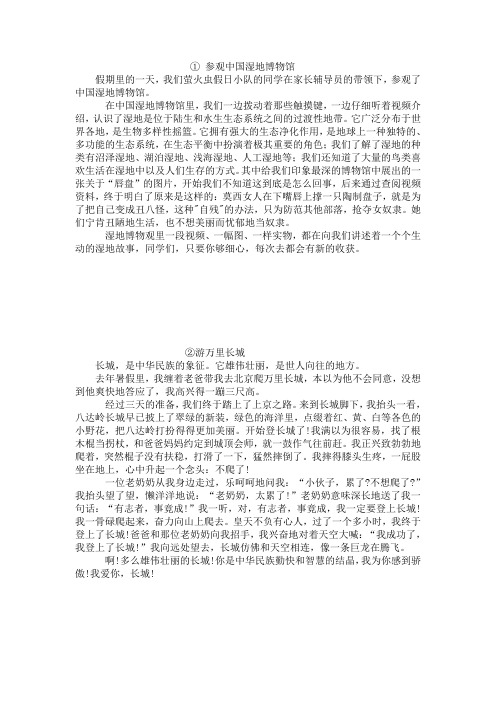
①参观中国湿地博物馆假期里的一天,我们萤火虫假日小队的同学在家长辅导员的带领下,参观了中国湿地博物馆。
在中国湿地博物馆里,我们一边拨动着那些触摸键,一边仔细听着视频介绍,认识了湿地是位于陆生和水生生态系统之间的过渡性地带。
它广泛分布于世界各地,是生物多样性摇篮。
它拥有强大的生态净化作用,是地球上一种独特的、多功能的生态系统,在生态平衡中扮演着极其重要的角色;我们了解了湿地的种类有沼泽湿地、湖泊湿地、浅海湿地、人工湿地等;我们还知道了大量的鸟类喜欢生活在湿地中以及人们生存的方式。
其中给我们印象最深的博物馆中展出的一张关于“唇盘”的图片,开始我们不知道这到底是怎么回事,后来通过查阅视频资料,终于明白了原来是这样的:莫西女人在下嘴唇上撑一只陶制盘子,就是为了把自己变成丑八怪,这种"自残"的办法,只为防范其他部落,抢夺女奴隶。
她们宁肯丑陋地生活,也不想美丽而忧郁地当奴隶。
湿地博物观里一段视频、一幅图、一样实物,都在向我们讲述着一个个生动的湿地故事,同学们,只要你够细心,每次去都会有新的收获。
②游万里长城长城,是中华民族的象征。
它雄伟壮丽,是世人向往的地方。
去年暑假里,我缠着老爸带我去北京爬万里长城,本以为他不会同意,没想到他爽快地答应了,我高兴得一蹦三尺高。
经过三天的准备,我们终于踏上了上京之路。
来到长城脚下,我抬头一看,八达岭长城早已披上了翠绿的新装,绿色的海洋里,点缀着红、黄、白等各色的小野花,把八达岭打扮得得更加美丽。
开始登长城了!我满以为很容易,找了根木棍当拐杖,和爸爸妈妈约定到城顶会师,就一鼓作气往前赶。
我正兴致勃勃地爬着,突然棍子没有扶稳,打滑了一下,猛然摔倒了。
我摔得膝头生疼,一屁股坐在地上,心中升起一个念头:不爬了!一位老奶奶从我身边走过,乐呵呵地问我:“小伙子,累了?不想爬了?”我抬头望了望,懒洋洋地说:“老奶奶,太累了!”老奶奶意味深长地送了我一句话:“有志者,事竟成!”我一听,对,有志者,事竟成,我一定要登上长城!我一骨碌爬起来,奋力向山上爬去。
